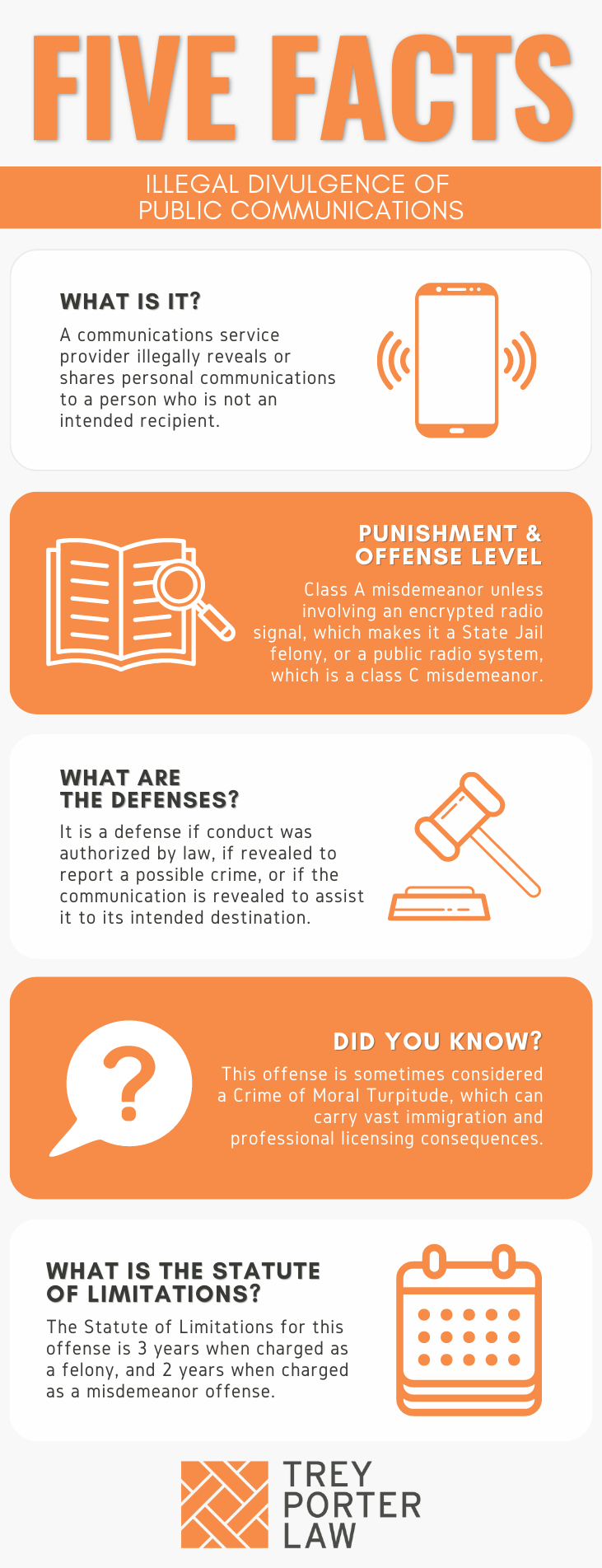WHAT IS ILLEGAL DIVULGENCE OF PUBLIC COMMUNICATIONS IN TEXAS?
Illegal divulgence of public communications is when an electronic communications service provider knowingly releases the contents of an electronic communication, such as an email, text message, or social media private message to another who is not the intended recipient.

WHAT IS THE ILLEGAL DIVULGENCE OF PUBLIC COMMUNICATIONS LAW IN TEXAS?
Tex. Penal Code § 16.05. ILLEGAL DIVULGENCE OF PUBLIC COMMUNICATIONS.
(b) A person who provides electronic communications service to the public commits an offense if the person knowingly divulges the contents of a communication to another who is not the intended recipient of the communication.
(c) It is an affirmative defense to prosecution under Subsection (b) that the actor divulged the contents of the communication:
(1) as authorized by federal or state law;
(2) to a person employed, authorized, or whose facilities are used to forward the communication to the communication’s destination; or
(3) to a law enforcement agency if the contents reasonably appear to pertain to the commission of a crime.
(d) Except as provided by Subsection (e), an offense under Subsection (b) that involves a scrambled or encrypted radio communication is a state jail felony.
(e) If committed for a tortious or illegal purpose or to gain a benefit, an offense under Subsection (b) that involves a radio communication that is not scrambled or encrypted:
(1) is a Class A misdemeanor if the communication is not a public land mobile radio service communication or a paging service communication; or
(2) is a Class C misdemeanor if the communication is a public land mobile radio service communication or a paging service communication.
WHAT IS THE PENALTY CLASS FOR ILLEGAL DIVULGENCE OF PUBLIC COMMUNICATIONS IN TEXAS?
The penalty classification for illegal divulgence of public communications depends on the specific conduct, as follows:
- State jail felony, punishable by 180 days to two years in a state jail facility, if:
- a person illegally divulges the contents of a scrambled or encrypted radio communication;
- Class A misdemeanor, punishable by up to one year in jail, if:
- a person illegally divulges any communication other than a public land mobile radio service communication or a paging service communication, or a scrambled or encrypted radio communication;
- Class C misdemeanor, punishable by a maximum fine of $500, if:
- a person illegally divulges a public land mobile radio service communication or a paging service communication.
WHAT IS THE PUNISHMENT RANGE FOR ILLEGAL DIVULGENCE OF PUBLIC COMMUNICATIONS IN TEXAS?
The punishment range for the state jail felony illegal divulgence of public communications is 180 days to two years in a state jail facility, and up to a $10,000 fine. If charged as a Class A misdemeanor, it carries a possible year in county jail, and up to a $4,000 fine. If charged as a Class C misdemeanor, it is only punishable by a fine of up to $500.
WHAT ARE THE PENALTIES FOR ILLEGAL DIVULGENCE OF PUBLIC COMMUNICATIONS IN TEXAS?
As an alternative to confinement, a person charged with illegal divulgence of public communications may be placed on probation after a conviction, or deferred adjudication without a conviction. The period of community supervision for a state jail felony is between two and five years, and up to two years for a Class A misdemeanor. A person charged with a Class C misdemeanor may only be punished by a fine if convicted, but may be placed on deferred adjudication for up to 180 days to avoid a conviction.
WHAT ARE THE DEFENSES TO ILLEGAL DIVULGENCE OF PUBLIC COMMUNICATIONS IN TEXAS?
Most prosecuting offices in Texas cities and counties lack the requisite technology to prove an electronic communications service provider knowingly divulged the contents of a communication to someone other than the intended recipient. An illegal divulgence, without authorization, must be committed “knowingly,” and providers will commonly assert the divulgence was inadvertent.
The statute provides three affirmative defenses. It is not a crime for an electronic communications service provider to divulge the contents of the communication if:
- it was authorized by federal or state law;
- it was divulged to a person employed, authorized, or whose facilities are used to forward the communication to the intended recipient; or
- it was sent to a law enforcement agency and the contents reasonably appear to pertain to committing a crime.
WHAT IS THE STATUTE OF LIMITATIONS FOR ILLEGAL DIVULGENCE OF PUBLIC COMMUNICATIONS IN TEXAS?
The limitation period for illegal divulgence of public communications charged as a state jail felony is three years. If it is charged as either a Class A or Class C misdemeanor, the limitation period is two years.
ILLEGAL DIVULGENCE OF PUBLIC COMMUNICATIONS IN TEXAS
Illegal divulgence of public communications is not often pursued at the state level, due to the lack of technology required to prove this offense was committed knowingly. Federal law enforcement agencies, however, more commonly investigate and prosecute these types of cyber crimes.
















